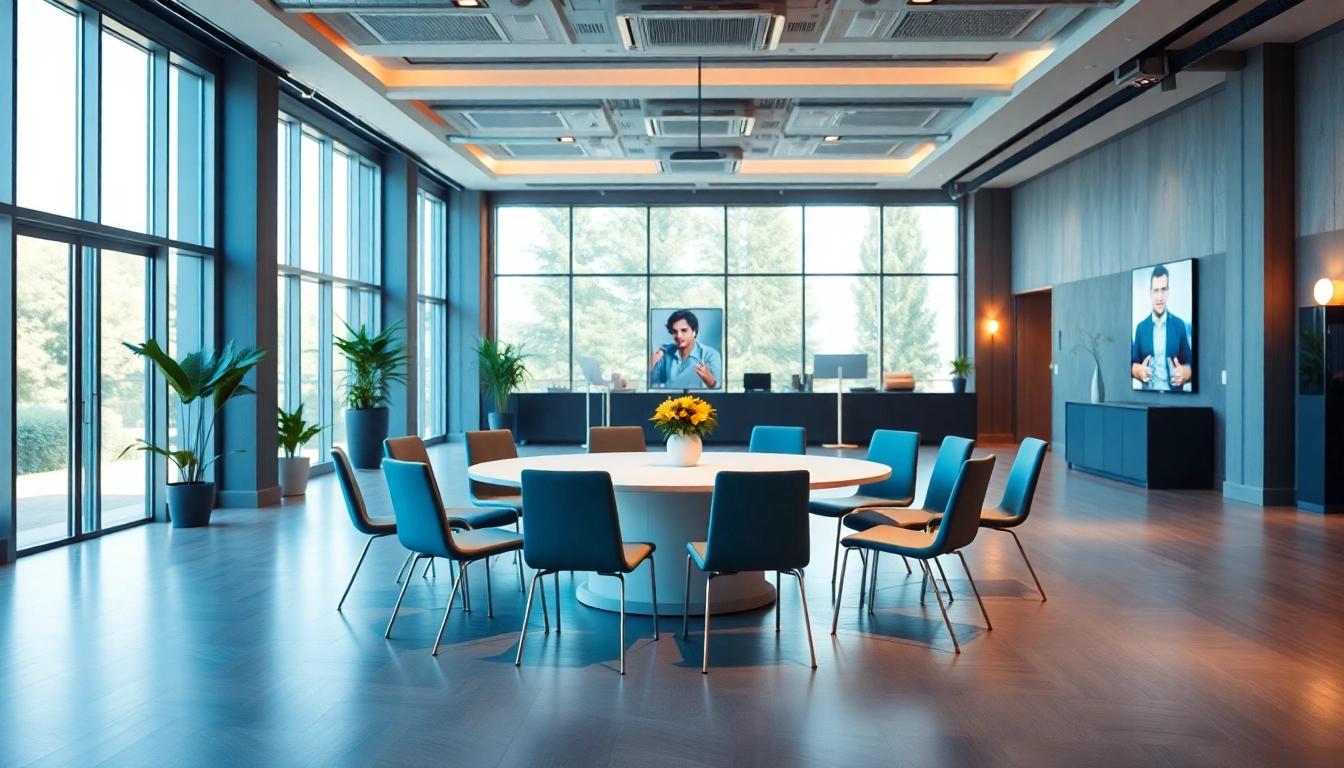Understanding the Concept of Event Space
Defining Event Space and Its Importance
An event space is a dedicated area designed to host various gatherings, from corporate meetings and trade shows to weddings and social celebrations. The importance of choosing the right event space cannot be overstated; it sets the mood, influences attendance, enhances guest experiences, and can contribute significantly to the overall success of an event. Ideally situated with ample accessibility, an event space serves as a canvas upon which hosts can paint their vision, making it a pivotal element in event planning.
The Different Types of Event Spaces
Event spaces come in various configurations and styles, catering to different needs and preferences. Some of the common types include:
- Convention Centers: Large spaces capable of hosting significant gatherings like trade shows, conferences, or exhibitions.
- Banquet Halls: Perfect for events that require dining, such as weddings and corporate events, often featuring catering services.
- Outdoor Venues: Parks, gardens, or rooftop settings that offer natural beauty and flexibility for casual events.
- Unique Spaces: Warehouses, lofts, and galleries that can add an exceptional touch to the event experience.
- Corporate Facilities: Spaces specifically designed for business meetings, complete with meeting rooms and AV equipment.
Choosing the Right Event Space for Your Needs
Selecting the right event space demands careful consideration of several factors, including the event’s purpose, expected attendance, and the desired atmosphere. It’s advantageous to start by defining the type of event and its objectives. For instance, a corporate retreat may benefit from a space that allows for both formal discussions and informal networking opportunities. In contrast, a wedding might necessitate more aesthetic considerations, like natural light or picturesque backdrops.
Key Features to Look For in an Event Space
The Role of Location in Event Space Selection
The location of an event space plays a critical role in its accessibility and overall success. Considerations include proximity to major transport links, hotels for out-of-town guests, and local attractions that can enhance the overall experience for attendees. Selecting a venue in a central area can increase attendance and make logistics simpler for event organizers.
Amenities That Enhance Your Event Space Experience
Amenities significantly impact the functionality and comfort of an event space. Look for features such as:
- Audio-Visual Equipment: Systems that can provide sound, projection, and lighting enhance presentations and performances.
- Wi-Fi Access: Essential for corporate events, ensuring that attendees can stay connected.
- Catering Options: Availability of on-site catering or partnerships with local food services can simplify planning.
- Accessibility Features: Ensuring the venue is accessible to all guests, including ramps and suitable restrooms.
- Parking Facilities: Adequate parking or arrangements for transportation can minimize stress for both organizers and attendees.
Capacity Requirements and Layout Options
Understanding the event size is crucial for selecting a suitable venue. Capacity requirements often dictate the choice of space, but layout options can also influence the feel of the event. For instance, a theater-style setup is ideal for presentations, while a banquet layout promotes dining and mingling. It’s vital to visualize the space in relation to your event’s activities to create a welcoming and functional atmosphere.
Planning and Organizing an Event in an Event Space
Step-by-Step Guide to Event Space Booking
Booking an event space can seem daunting, but breaking it down into manageable steps can simplify the process. Here’s a methodical approach:
- Define Your Needs: Establish the event type, required amenities, and overall budget.
- Research Options: Utilize online tools and directories to find available spaces that meet your criteria.
- Visit Potential Venues: Schedule tours of shortlisted venues to assess their suitability firsthand.
- Review Contract Terms: Thoroughly examine contract details including cancellation policies, payment schedules, and terms of service.
- Finalize the Booking: Secure the venue by signing the contract and making the necessary deposits.
Collaborating with Event Space Managers
Effective collaboration with event space managers can significantly enhance the planning process. Prior to finalizing your booking, communicate your event objectives, setup desires, and guest requirements clearly. A good manager will offer insights and suggestions based on their experience, helping to troubleshoot potential issues before they arise. Establishing a friendly rapport can also facilitate smoother communication in the lead-up to the event.
Best Practices for Event Setup and Execution
Successful event execution hinges on thorough preparation. Arrange a comprehensive setup checklist that includes:
- Seating arrangements and layout design
- Signage and wayfinding elements
- Technical checks for audio and visual equipment
- Refreshment stations or catering setup
- Registration and welcome areas
Incorporating a walkthrough with your team on the event day to ensure everything flows as planned can mitigate operational hiccups.
Cost Considerations for Your Event Space
Budgeting for Event Space Rental
Creating a detailed budget is vital in preventing overspending on your event space. Begin by analyzing total expenses, including venue rental, catering, technology, and decor. Be realistic about costs and consider establishing a contingency fund for unexpected expenses, which could include last-minute equipment rentals or additional catering needs.
Identifying Hidden Costs in Event Space Agreements
Event space contracts can often include hidden costs that may not be immediately apparent. These might include:
- Service fees or gratuities
- Cleaning fees post-event
- Rental durations exceeding standard agreements
- Insurance requirements
Understanding and planning for these potential extra costs can prevent budget overruns and unpleasant surprises.
Negotiation Tips for Securing the Best Event Space Deals
Negotiating the terms of your event space rental can yield significant savings. Here are several tips:
- Know Your Market: Research similar venues to understand average rental costs and services offered.
- Be Flexible: If your event date allows for flexibility, venues may offer discounts for off-peak times.
- Ask for Package Deals: Some venues may provide bundled pricing for catering, AV equipment, and rental fees.
- Build a Relationship: Developing rapport with venue staff can lead to more favorable agreements.
Promoting Your Event in the Chosen Event Space
Marketing Strategies for Event Space Promotion
After securing your event space, the next step involves effective promotion to attract attendees. Consider these strategies:
- Developing a dedicated website or event page
- Using email marketing to reach potential guests
- Partnering with influencers to expand reach
- Utilizing local media outlets for greater visibility
The Impact of Social Media on Event Space Success
In today’s digital age, social media can be a powerful tool in promoting events. It allows you to engage with potential attendees and build excitement around your gathering. Create event-specific hashtags, encourage users to share their experiences, and post behind-the-scenes content leading up to the event. Use platforms that align with your audience, whether it be Facebook, Instagram, or LinkedIn, to maximize reach and engagement.
Post-Event Follow-Up Strategies for Future Engagement
Following up after an event builds lasting relationships with attendees and can provide valuable feedback for future planning. Strategies include:
- Sending thank you emails to attendees
- Requesting feedback through surveys to gather insights about the event experience
- Sharing event photos and highlights on social media or via newsletters
These actions not only show appreciation but also lay the groundwork for future events and strengthen community engagement.



